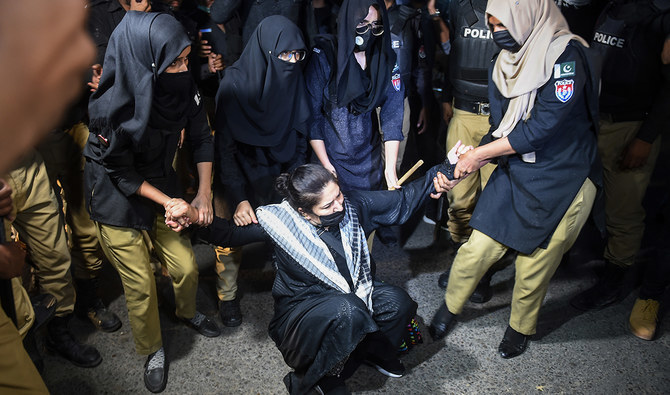ISLAMABAD: The Human Rights Watch (HRW), an international rights advocacy group, on Saturday urged the Pakistani government to end “arbitrary arrests” of political activists and peaceful protesters in the wake of ex-prime minister Imran Khan’s arrest earlier this month.
The development comes amid a clamp down on Khan’s Pakistan Tehreek-e-Insaf (PTI) party after violent protests in the South Asian country over the ex-premier’s arrest in a land fraud case this month. The party says more than 7,000 supporters and at least 19 senior members have been detained by authorities “without investigation.”
Videos circulating on social media showed enraged protesters vandalizing and torching government buildings, sensitive military installations, and the house of a top army official in Lahore to demand Khan’s release. He was later granted bail and released from custody.
Prime Minister Shehbaz Sharif has vowed strict legal action against the rioters, while the army announced that those found involved in the violence would be tried under relevant Pakistani laws, including the Pakistan Army Act.
“The Pakistani authorities should end their arbitrary arrests of political opposition activists and peaceful protesters,” Patricia Gossman, HRW associate director for Asia, said in a statement.
“Anyone committing violence should be appropriately charged and their due process rights respected.”
Pakistani authorities should display restraint and respect for human rights and the rule of law, she urged
“Fundamental guarantees of peaceful protest and due process should not become casualties of Pakistan’s political conflict,” Gossman added.
Meanwhile, the Lahore High Court (LHC), after hearing a petition filed by the PTI, nullified on Saturday detention orders of 123 Khan supporters taken into custody after the protests in Faisalabad, local media reeported. The court directed the government to release them immediately.
Khan, who was ousted in a no-trust vote in April last year, has attempted to disrupt the coalition government of PM Shehbaz Sharif by dissolving two provincial parliaments he controlled, agitating for early elections.
The former premier accuses the shaky coalition government of ousting him in cahoots with top generals, and has made explosive claims that they puppeteered a November assassination attempt that saw him shot in the leg as he campaigned for snap polls.
Khan has also launched an unprecedented campaign of defiance against the military, which independent analysts say helped him rise and fall from power.
Pakistani politicians have frequently been arrested and jailed since the country’s founding in 1947.
But few have so directly challenged a military that holds influence over domestic politics and foreign policy and has staged at least three coups and ruled for more than three decades.


















